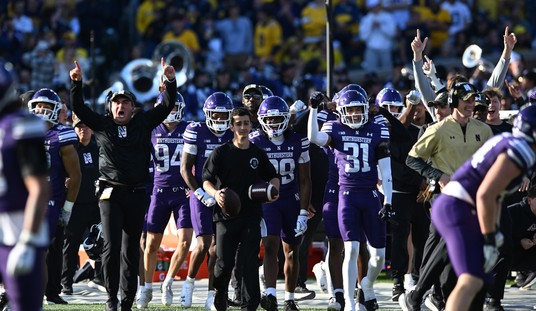Under pressure both politically and militarily, NATO member Turkey may finally climb off the fence in the fight against ISIS. Their parliament may vote to authorize ground troops in both Iraq and Syria this week to push back the terrorist army, which has come within five kilometers of Turkey’s border in places. The move might forestall the current efforts of Kurdish separatists who have coalesced into a fighting force to assist Syrian Kurds in the besieged city of Kobane.
Before the Turks move their ground forces, though, they want a no-fly zone imposed on Syria:
Turkey is likely to gain parliamentary approval for cross-border military operations in Syria and Iraq this week as Islamic State insurgents threaten its territory, but will be hesitant to send in troops without an internationally-enforced no-fly zone.
Turkish tanks and armored vehicles took up positions on hills overlooking the besieged Syrian border town of Kobani on Monday as shelling by the Sunni Muslim militants intensified and stray fire hit Turkish soil.
The Islamic State advance to within clear sight of the Turkish army has piled pressure on Ankara to take a more robust stance against the militants as part of the U.S.-led coalition carrying out air strikes in Iraq and Syria.
They don’t want a no-fly zone to protect them from ISIS, which has no air force. They want to make sure that Bashar al-Assad doesn’t take an opportunity to settle some scores while their army engages ISIS. In fact, their reluctance to get involved so far is based on their worry that their intervention will prop up Assad after all their efforts to get rid of him:
Turkey, a NATO member with long borders with both countries, has so far declined to take a frontline role, fearful partly that the military action will strengthen Syrian President Bashar al-Assad and bolster Kurdish militants allied to Kurds in Turkey who have fought for three decades for greater autonomy.
It also argues air strikes alone will do little to address the long-term instability on its 1,200 km southern frontier.
Kobane, also known as Ayn al-Arab, proves that much, anyway. The US and its allies have pounded ISIS positions near Kobane since beginning air operations in Syria, but it hasn’t broken the offensive at the border town. The Kurdish irregulars are trying to make up the difference, but ISIS is still advancing:
US-led strikes hit Islamic State group fighters closing on a key town on Syria’s border with Turkey overnight as Ankara prepared Tuesday to request parliamentary authorisation to join the coalition.
In neighbouring Iraq, Kurdish forces launched pre-dawn attacks against the jihadists on three fronts in a bid to recapture territory they lost to IS last month, entering a key town on the border with Syria, senior officers said.
It was in support of Kurdish forces in northern Iraq that Washington launched its air war against IS on August 8, following a wave of atrocities by the advancing jihadists, before extending it to Syria.
The strikes by the US and its Arab allies against IS targets in Syria are now in their second week but they have yet to stop the jihadists pressing an advance that would give them unbroken control of a swathe of Syria’s northern border.
In other words, airstrikes in support of lightly-armed militias won’t suffice against a marauding army. It doesn’t take Patton to figure that out, even when the air campaign is intensified. It takes boots on the ground to repeal such a horde, and the Kurdish irregulars aren’t armed or trained for such a task. The Turks are belatedly realizing that the genie they helped out of the bottle doesn’t respect borders and isn’t concerned with joining hands in an anti-Assad coalition after all, and at least recognize that ground troops have to be used to deny ISIS ground.
If the price for that badly-needed participation is a no-fly zone, I’d expect the US to pay it — if possible. That was one of the options that the Obama administration looked at in 2013 in retaliation for Assad’s use of chemical weapons, later discarded for strikes on the units that used the weapons. The question will be whether the US can enforce it. So far the Syrians have been passive about the intrusions into their airspace — not cooperative, but also not actively contesting them. They haven’t even complained about them very much, even though our operations force the Syrians to respect a de facto no-fly zone to avoid open hostilities with the US-led coalition. If the US demanded an internationally-imposed, explicit no-fly zone over anything larger than the cities where the strikes are taking place, the Syrians will surely balk, and that could put our airstrike operations out of business, at least temporarily.
Perhaps the US can sweet-talk Turkey into accepting the fact that while our planes are in the air, Assad’s won’t come close. Besides, with ISIS about to hit their frontiers, the Turks have a choice — fight ISIS on Assad’s ground, or their own.








Join the conversation as a VIP Member